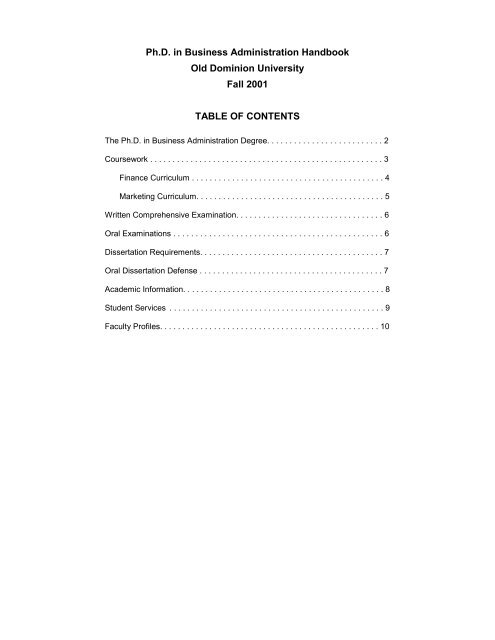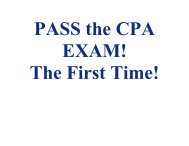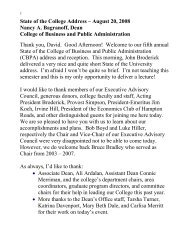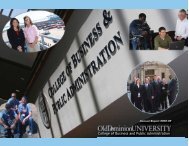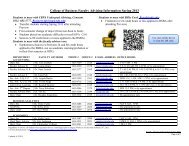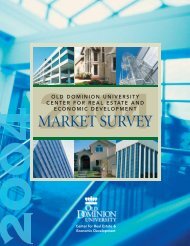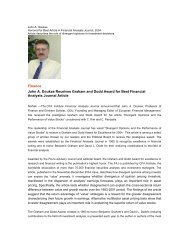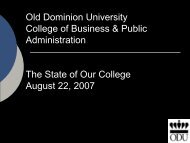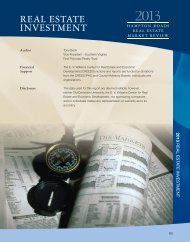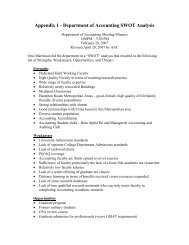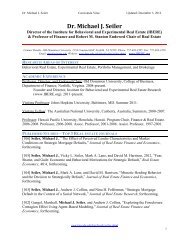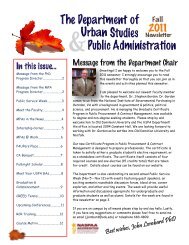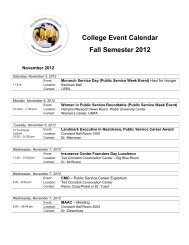STUDENT HANDBOOK - College of Business & Public Administration
STUDENT HANDBOOK - College of Business & Public Administration
STUDENT HANDBOOK - College of Business & Public Administration
You also want an ePaper? Increase the reach of your titles
YUMPU automatically turns print PDFs into web optimized ePapers that Google loves.
Ph.D. in <strong>Business</strong> <strong>Administration</strong> Handbook<br />
Old Dominion University<br />
Fall 2001<br />
TABLE OF CONTENTS<br />
The Ph.D. in <strong>Business</strong> <strong>Administration</strong> Degree. . . . . . . . . . . . . . . . . . . . . . . . . . 2<br />
Coursework . . . . . . . . . . . . . . . . . . . . . . . . . . . . . . . . . . . . . . . . . . . . . . . . . . . . 3<br />
Finance Curriculum . . . . . . . . . . . . . . . . . . . . . . . . . . . . . . . . . . . . . . . . . . . 4<br />
Marketing Curriculum. . . . . . . . . . . . . . . . . . . . . . . . . . . . . . . . . . . . . . . . . . 5<br />
Written Comprehensive Examination. . . . . . . . . . . . . . . . . . . . . . . . . . . . . . . . . 6<br />
Oral Examinations . . . . . . . . . . . . . . . . . . . . . . . . . . . . . . . . . . . . . . . . . . . . . . . 6<br />
Dissertation Requirements. . . . . . . . . . . . . . . . . . . . . . . . . . . . . . . . . . . . . . . . . 7<br />
Oral Dissertation Defense . . . . . . . . . . . . . . . . . . . . . . . . . . . . . . . . . . . . . . . . . 7<br />
Academic Information. . . . . . . . . . . . . . . . . . . . . . . . . . . . . . . . . . . . . . . . . . . . . 8<br />
Student Services . . . . . . . . . . . . . . . . . . . . . . . . . . . . . . . . . . . . . . . . . . . . . . . . 9<br />
Faculty Pr<strong>of</strong>iles. . . . . . . . . . . . . . . . . . . . . . . . . . . . . . . . . . . . . . . . . . . . . . . . . 10
THE PH.D. IN BUSINESS ADMINISTRATION DEGREE<br />
Introduction<br />
The Doctor <strong>of</strong> <strong>Business</strong> <strong>Administration</strong> (DBA) program was established at Old Dominion University in August <strong>of</strong><br />
1989 for the purpose <strong>of</strong> preparing outstanding candidates for academic careers in higher education and<br />
research or staff positions in industry and government. In the Fall <strong>of</strong> 1995, the program’s name changed from<br />
DBA to Ph.D. The program stresses academic competence through preparation in a major field <strong>of</strong> business<br />
administration combined with a major emphasis on international business that includes course work, research<br />
and exposure to a foreign language. In addition, competence must be demonstrated in economics and<br />
quantitative areas which provide necessary research and methodology tools.<br />
The program <strong>of</strong> study is personalized in order to meet the specific interest <strong>of</strong> the doctoral student, his/her<br />
general academic preparation and pr<strong>of</strong>essional experience, and the expectations <strong>of</strong> both the faculty and<br />
candidate. A graduate with the educational experience outlines above will have met the highest standards for<br />
advancement in his/her chosen area <strong>of</strong> interest.<br />
The student is responsible for determining that all degree requirements are satisfied. Therefore, the doctoral<br />
student should be familiar with the entire contents <strong>of</strong> this manual in order to be fully cognizant <strong>of</strong> the structure <strong>of</strong><br />
the Ph.D. program and departmental requirements. The handbook is not intended to be used as a replacement<br />
for, but rather a supplement to, the Old Dominion University Catalog which contains university policies and<br />
procedures.<br />
Admission Requirements<br />
Students wishing to apply to the Ph.D. program must complete the Old Dominion University graduate application<br />
form which is available in the Office <strong>of</strong> Admissions. The deadline for receipt <strong>of</strong> the application and credentials is<br />
April 1 for enrollment in the following fall term.<br />
Credentials<br />
It is expected that the Ph.D. applicant will have an MBA degree, or equivalent, from an accredited business<br />
program. The applicant must submit <strong>of</strong>ficial copies <strong>of</strong> transcripts from all institutions <strong>of</strong> higher education<br />
attended, <strong>of</strong>ficial scores on the Graduate Management Admission Test, and three letters <strong>of</strong> recommendation<br />
(suggested: two academic and one pr<strong>of</strong>essional).<br />
Goals Statement<br />
The applicant should submit a statement <strong>of</strong> goals, approximately 2-3 pages, on how the completion <strong>of</strong> the<br />
doctoral program will assist in achieving personal and pr<strong>of</strong>essional career goals. The goals statement will be<br />
assessed on the basis <strong>of</strong> writing pr<strong>of</strong>iciency and content.<br />
Resume<br />
The applicant must submit a concise pr<strong>of</strong>essional and/or academic resume which highlights both past and<br />
current experiences and training.<br />
Interview<br />
After submission <strong>of</strong> application and credentials, the Ph.D. applicant is advised to arrange for a personal<br />
interview with the program director and major department Ph.D. representative. However, it is recognized that<br />
some applicants may be unable to visit the university for a personal interview. In such cases, a telephone<br />
interview may be conducted or the applicant may request a waiver.<br />
The Admission Process<br />
The application and all credentials are submitted directly to the Office <strong>of</strong> Admissions. During the latter part <strong>of</strong><br />
February and the month <strong>of</strong> March, completed student files are forwarded to the Ph.D. Program Director for initial<br />
screening. Admission decisions are made by the Ph.D. Program Director in close consultation with the Doctoral<br />
Advisory Committee in <strong>Business</strong> <strong>Administration</strong>. Suggested quantitative guidelines for regular admission to the<br />
Ph.D. program are a 3.5 grade point average (on a 4.0 scale) for all prior graduate work and a GMAT score <strong>of</strong><br />
580 or higher, taken within the past five years. Qualitative measures include the letters <strong>of</strong> recommendation,<br />
goals statement, resume, and interview; such measures will be evaluated based on the applicant’s abilities and<br />
motivation to succeed in the doctoral program.<br />
If the Ph.D. applicant is approved for regular admission, he/she is <strong>of</strong>ficially admitted. The Ph.D. program director<br />
notifies both the student and the Office <strong>of</strong> Admissions and maintains the student’s records. In some cases, a<br />
candidate may be admitted provisionally into the program and admission regularized upon satisfactory<br />
completion <strong>of</strong> the conditions set forth in the acceptance letter from the Ph.D. in <strong>Business</strong> <strong>Administration</strong><br />
Program Director.<br />
2
COURSEWORK<br />
Prerequisites (Variable credit hours)<br />
Students without sufficient quantitative background (e.g., calculus, matrix algebra and statistics) will be required<br />
to take, as prerequisites, course work in these fields. Often, this can be accomplished in the summer preceding<br />
entrance into the program. The student without an MBA degree must take the following breadth-level MBA<br />
courses prior to the doctoral courses: Accounting for managers (ACCT 601), Global and Applied<br />
Macroeconomics (ECON 612), Financial Management (FIN 605), Organizational Management (MGMT 602),<br />
and Marketing Management (MKTG 603). Therefore, it is not unusual that satisfying foundation requirements<br />
extends the student’s time <strong>of</strong> study by as much as a year or more.<br />
In addition to the previous prerequisites, those students pursuing the Finance concentration need to take<br />
Mathematical Economics (ECON 525).<br />
The following is the program outline for a full time student. However, all students will be assigned to an advisor<br />
who will monitor the student’s progress and guide them through the program.<br />
3
FIRST YEAR<br />
Ph.D. BUSINESS ADMINISTRATION DEGREE PROGRAM OUTLINE<br />
FINANCE CURRICULUM<br />
FALL<br />
BUSN 800 International <strong>Business</strong> Seminar (3 hrs)<br />
ECON 801 Micro-Economic Theory (3 hrs)<br />
ECON 806 Econometric Theory & Modeling (3 hrs)<br />
SPRING<br />
ECON 807 Econometrics II (3 hrs)<br />
MGMT 821 Seminar in International Strategic Management (3 hrs)<br />
Prerequisite: BUSN 800<br />
Required for all doctoral students<br />
MKTG 826 Seminar in International Marketing Strategy (3 hrs)<br />
Prerequisite: BUSN 800<br />
Required for all doctoral students<br />
Foreign language requirement must be completed during summer <strong>of</strong> first year<br />
SECOND YEAR<br />
FALL FIN 860 Seminar in Financial Theory (3 hrs)<br />
ECON 808 Econometrics III (3 hrs)<br />
FIN 862Seminar in International Finance (3 hrs)<br />
Prerequisite: BUSN 800<br />
Required for all doctoral students<br />
*BUSN 801 Doctoral Research/Teaching Colloquium (1 hr)<br />
Note:<br />
International Comprehensive Examination to be taken at the end <strong>of</strong> Fall in the second year <strong>of</strong><br />
the program.<br />
SPRING FIN 861 Seminar in Investments (3 hrs)<br />
FIN 863<br />
Seminar Current Financial Topics (3 hrs)<br />
ECON 852 International Trade (3 hrs)<br />
*BUSN 801 Research Teaching Colloquium (1 hr)<br />
Note:<br />
Functional Field Comprehensive Examination to be taken at the end <strong>of</strong> the Spring Semester in<br />
the second year <strong>of</strong> the program.<br />
THIRD YEAR<br />
FALL<br />
*BUSN 801 Doctoral Research/Teaching Colloquium (1 hr)<br />
Work on dissertation research<br />
* Advanced doctoral level statistical/research methods course (3 hrs) can substitute for BUSN 801 series.<br />
4
FIRST YEAR<br />
Ph.D. BUSINESS ADMINISTRATION DEGREE PROGRAM OUTLINE<br />
MARKETING CURRICULUM<br />
FALL<br />
BUSN 800 International <strong>Business</strong> Seminar (3 hrs)<br />
DSCI 800<br />
DSCI 811<br />
Matrix Algebra (1 hr)<br />
Regression & Multivariate Analysis (3 hrs)<br />
MKTG 801 Marketing Theory Seminar (3 hrs)<br />
SPRING DSCI 812 Advanced Statistical Methods in <strong>Business</strong> Research (3 hrs)<br />
MKTG 826 Seminar in International Marketing Strategy (3 hrs)<br />
Prerequisite: BUSN 800<br />
Required for all doctoral students<br />
MGMT 821 Seminar in International Management (3 hrs)<br />
Prerequisite: BUSN 800<br />
Required for all doctoral students<br />
*BUSN 801 Doctoral Research/Teaching Colloquium (1 hr)<br />
Foreign language requirement must be completed during summer <strong>of</strong> first year<br />
SECOND YEAR<br />
FALL<br />
MKTG 802 Seminar in Marketing Concepts and Issues (3 hrs)<br />
MKTG 813 Fundamentals <strong>of</strong> Survey Research (3 hrs)<br />
FIN 862<br />
Seminar in International Finance (3 hrs)<br />
Prerequisite: BUSN 800<br />
Required for all doctoral students<br />
*BUSN 801 Doctoral Research/Teaching Colloquium (1 hr)<br />
Note:<br />
SPRING<br />
International Comprehensive Examination to be taken at the end <strong>of</strong> Fall in the second year <strong>of</strong><br />
the program.<br />
MKTG 827 Seminar in Marketing Strategy (3 hrs)<br />
MKTG 814 Seminar in Advanced Marketing Methodology (3 hrs)<br />
ECON 852 International Trade (3 hrs)<br />
*BUSN 801 Research Teaching Colloquium (1 hr)<br />
Note:<br />
Functional Field Comprehensive Examination to be taken at the end <strong>of</strong> the Spring Semester in<br />
the second year <strong>of</strong> the program.<br />
THIRD YEAR<br />
Work on dissertation research<br />
* Advanced doctoral level statistical/research methods course (3 hrs) can substitute for BUSN 801 series.<br />
5
WRITTEN COMPREHENSIVE EXAMINATIONS<br />
Purpose<br />
The examinations qualifying the student for candidacy for the Ph.D. degree is comprehensive and tests the<br />
student’s knowledge <strong>of</strong> subject matter in the international business and major area or concentration. Because<br />
successful completion <strong>of</strong> the examinations allows the student to pursue a dissertation, the examinations focuses<br />
on the student’s ability to develop, synthesize, analyze and apply important concepts and theories. In addition, it<br />
emphasizes recall <strong>of</strong> specific important arguments, approaches, pro<strong>of</strong>s, and concepts from the literature in the<br />
area.<br />
Timing<br />
The written candidacy examinations will be taken after the completion <strong>of</strong> all course work requirements as listed<br />
in the plan <strong>of</strong> study. These examinations are composed <strong>of</strong> two parts: international business and area<br />
concentration. The examinations on international business (IB) include management, marketing, and finance.<br />
Each <strong>of</strong> these examinations is expected to last approximately three hours. The examination on area<br />
concentration is expected to consume about six hours. These examinations are regularly scheduled twice a year<br />
at the beginning <strong>of</strong> fall and spring semesters.<br />
Examination Committee<br />
The candidacy examinations are prepared and evaluated by the examination committees composed <strong>of</strong> the<br />
graduate faculty who are primarily responsible for teaching doctoral courses in international business and area<br />
concentration respectively. The Chair <strong>of</strong> each <strong>of</strong> the Examination Committees will communicate the results <strong>of</strong><br />
the examinations to the student and the Ph.D. Program Director in writing. A student who fails any part <strong>of</strong> the<br />
written comprehensive examinations (i.e., international management, international marketing, international<br />
finance, and/or area concentration) on the first administration may retake the failed part(s) <strong>of</strong> the written<br />
examinations. Reexamination is allowed just once. The students who successfully completed written<br />
examinations are then permitted to take oral examinations.<br />
Form Required<br />
The student completes the “Request for Permission to take the Ph.D. Candidacy Examination” form and submits<br />
it directly to the Program Director no less than 30 days before the examination. After completion <strong>of</strong> the<br />
examination, the “Results <strong>of</strong> Ph.D. Examination” form is completed by the appropriate faulty members and the<br />
program director.<br />
ORAL EXAMINATIONS<br />
Purpose<br />
The oral examination follows-up the written international business and major area examination, and the student<br />
should be prepared to clarify answers which were given on the written examinations as well as answer<br />
additional questions on material that the examination committee feels appropriate.<br />
Timing<br />
The oral examination should be scheduled within two weeks <strong>of</strong> notification <strong>of</strong> the written examination results.<br />
Evaluation<br />
The Examination Committee members who participated in the written candidacy examinations usually<br />
participate in the oral examinations. The Examination Committee makes the final determination about the quality<br />
<strong>of</strong> the oral examination. Students who fail an oral examination <strong>of</strong> the first administration may be given a second<br />
chance. The student must pass all the written and oral examinations to be qualified for the candidacy <strong>of</strong> the<br />
Ph.D. degree in <strong>Business</strong> <strong>Administration</strong>. NO part <strong>of</strong> a candidacy examination can be passed conditionally, nor<br />
can a pass be made contingent upon doing additional work. The fact that the student has done well on written<br />
examination does not mean that the oral examination is a pro forma exercise.<br />
Forms Required<br />
The student completes the “Application for Candidacy Examination” form and submits it directly to the program<br />
director no less than 10 days before the examination is scheduled. After completion <strong>of</strong> the examination, the<br />
“Results <strong>of</strong> Ph.D. Examination” form is completed by the appropriate faculty members and the program director.<br />
6
DISSERATION REQUIREMENTS<br />
Dissertation Advisory Committee<br />
As soon as possible after the student’s Examination Committee has certified that the written and oral<br />
examinations have been passed, the student must form the Dissertation Committee. The committee’s purpose<br />
is to supervise the selection <strong>of</strong> the dissertation topic, constructively critique the research methodology, and<br />
serve as a guidance body until the completion <strong>of</strong> the dissertation. The committee should have at least three<br />
members, one <strong>of</strong> whom is from outside the department <strong>of</strong> the major field <strong>of</strong> study. The chair <strong>of</strong> the committee<br />
will be from the candidate’s major field and be an authority in the field <strong>of</strong> specialization chosen for the<br />
dissertation research.<br />
Selection <strong>of</strong> Topic<br />
With guidance from the committee, a candidate will select a topic and defend his/her proposal demonstrating the<br />
originality <strong>of</strong> the research, requisite literature review, and methodology to be employed. The committee will<br />
judge the merits <strong>of</strong> the proposal, making any suggestions and/or additions as deemed necessary. The topic is<br />
then approved in writing with copies <strong>of</strong> the proposal to the Program Director and dean <strong>of</strong> the <strong>College</strong>. After<br />
successful defense <strong>of</strong> the proposal, the candidate will begin to conduct original research.<br />
Research and Preparation<br />
Research results and preliminary drafts <strong>of</strong> the dissertation will be provided to the committee by the student<br />
during the research phase. While in the dissertation stage, the student must register for a minimum <strong>of</strong> 1 credit<br />
hour per semester. The total number <strong>of</strong> credit house for the dissertation shall be no less than 18 and no more<br />
than 24 credit hours. The Ph.D. candidate should be <strong>of</strong>ficially enrolled at the University in order to expect advice<br />
or assistance from the committee member. General regulations and procedures governing the submission <strong>of</strong> the<br />
doctoral dissertation are provided in the “University Guide for Preparation <strong>of</strong> Thesis and Dissertation” which may<br />
be obtained from the Office <strong>of</strong> Academic Affairs.<br />
ORAL DISSERTATION DEFENSE<br />
The final defense <strong>of</strong> the dissertation is the last requirement <strong>of</strong> the program prior to submission <strong>of</strong> the<br />
Dissertation. At least two weeks prior to the date <strong>of</strong> the defense, the student must schedule the dissertation<br />
defense with the Ph.D. Program Director’s <strong>of</strong>fice. The objective <strong>of</strong> the oral defense <strong>of</strong> the dissertation is to<br />
explore with the candidate the methodology and substantive contributions <strong>of</strong> the dissertation. Through this<br />
process, the examiners and the candidate reach a common understanding <strong>of</strong> the research area and can<br />
mutually agree upon its merits for publication. Majority approval <strong>of</strong> the examiners constitutes successful<br />
completion <strong>of</strong> the defense <strong>of</strong> the dissertation.<br />
Forms Required<br />
The student is responsible for originating the following forms: “Ph.D. Dissertation Committee”, “Request for<br />
Permission to Take the Ph.D. Candidacy Examination/Dissertation Defense” and “Thesis/Dissertation Delivery”.<br />
The dissertation committee will complete the following form: “Thesis/Dissertation Acceptance and Processing”.<br />
7
ACADEMIC INFORMATION<br />
Continuance Regulation<br />
To remain in good standing after admission to the program is dependent upon satisfactory progress in doctoral<br />
coursework and faculty evaluations submitted to the Program Director. At a minimum, students must maintain a<br />
cumulative grade point average <strong>of</strong> 3.2 in all course work attempted at the University. Students who fall below<br />
this minimum standard will have one semester to remedy this deficiency. Further, students may earn no more<br />
than three (3) credit hours with the grade <strong>of</strong> “C”. Any student receiving a grade lower than a “C-“ in course work<br />
will be excused from the program and his/her status changed to non-degree.<br />
Time Limitation<br />
The Ph.D. program assumes that a well-qualified and prepared student can complete all degree requirements in<br />
three years <strong>of</strong> full-time work. If a student is unable to pursue the degree on the equivalent, full-time basis, or if<br />
the major field is different from previous academic training, more time to complete the degree is usually<br />
required. The maximum time allowed to complete all degree requirements is eight calendar years from date <strong>of</strong><br />
enrollment in the program.<br />
Residency Requirement<br />
Students who wish to begin the program part-time are strongly urged to enroll in full-time status after two<br />
calendar years. In any event, doctoral students are expected to spend a minimum <strong>of</strong> two consecutive semesters<br />
engaged in full-time study, not in including summers, prior to the dissertation stage. Doctoral study involves a<br />
devotion to independent study and interaction with faculty and other doctoral students to fully benefit from the<br />
experience.<br />
Transfer Credit<br />
In consultation with the faculty in the student’s major, transfer credit may be approved at the discretion <strong>of</strong> the<br />
program director. A maximum <strong>of</strong> 12 credit hours <strong>of</strong> post master’s-level graduate work may be applied toward<br />
completion <strong>of</strong> the requirements for the doctoral degree. The student should complete an “Evaluation <strong>of</strong><br />
Internal/External Transfer Credits” form.<br />
Waivers Using Previous Graduate Work<br />
A maximum <strong>of</strong> 9 credit hours <strong>of</strong> master’s-level graduate work may be applied toward completion <strong>of</strong> the<br />
requirements for the doctoral degree. The previous course work must have been <strong>of</strong> “B” letter-grade quality or<br />
higher, and must have been completed within the five yeas immediately preceding entry into the doctoral<br />
program<br />
Course Loads<br />
The normal course load for a full-time student is nine (9) credit hours. Part-time students are discouraged from<br />
enrolling in more than six (6) credit hours per semester.<br />
Course Numbering<br />
Graduate courses in the <strong>College</strong> <strong>of</strong> <strong>Business</strong> and public <strong>Administration</strong> are <strong>of</strong>fered at the 500-, 600-, 700-, and<br />
800-level. Courses numbered 700/800 are available to both master's and doctoral level students. Ph.D. students<br />
should register at the 800-level when courses are jointly <strong>of</strong>fered at two levels.<br />
8
<strong>STUDENT</strong> SERVICES<br />
Financial Assistance<br />
On a case-by-case basis, full-time Ph.D. students are funded through graduate teaching or research<br />
assistantships which currently carry a stipend <strong>of</strong> $10,000 for a ten (10) month service period. Tuition is waived<br />
for students receiving assistantships at the doctoral level. Financial support for a candidate in the form <strong>of</strong> a<br />
graduate assistantship may be provided for a maximum period <strong>of</strong> three (3) years. Students wishing to apply for<br />
a graduate assistantship should complete the “Application for Graduate Financial Aid” form. Complete<br />
information regarding assistantships can be found in the University Catalog. Information regarding other types <strong>of</strong><br />
financial aid (scholarships, grants, and loans) can be obtained from the Office <strong>of</strong> Financial Aid.<br />
Advising<br />
Ph.D. Students are initially advised by the program director. A registration form should be completed each<br />
semester in which the student intends to enroll and then stamped by the Ph.D. Program Office.<br />
Registration<br />
Pre-registration for currently enrolled students takes place in April for the summer and fall semesters and in<br />
November for the spring semester. The university operates various satellite locations for registration in addition<br />
to the main registration enter. Students taking <strong>of</strong>f-campus courses may also register at those sites.<br />
Payment <strong>of</strong> Tuition<br />
Please check current information in the Old Dominion Schedule <strong>of</strong> Classes for the appropriate semester<br />
deadlines for payment <strong>of</strong> tuition. A “Tuition Waiver” from will be completed for students with an assistantship.<br />
Failure to pay tuition on time will result in the student being dropped from course work.<br />
Library Privileges<br />
Ph.D. candidates who have passed the comprehensive examinations may have semester loan privileges in the<br />
Old Dominion University Library.<br />
Career Development Services<br />
The Office <strong>of</strong> Career Development has a counselor for business students seeking assistance with resume<br />
writing, resources and job searches. Please check ODU telephone book for number.<br />
CBPA Faculty Computer lab<br />
Ph.D. students can obtain a computer account and utilize the faculty computer lab located in Hughes hall, Room<br />
2126.<br />
English Writing Center<br />
The Center is available to help students improve their writing skills.<br />
Graduation Procedures<br />
Students must complete an application for graduation during the semester prior to graduation. Once degree<br />
requirements have been met, the Ph.D. student is certified for graduation by the Program Director and the<br />
Associate Dean <strong>of</strong> the <strong>College</strong>. The student will then receive a graduation packet from the Registrar’s Office<br />
which contains information regarding graduation announcements, cap and gown purchase, and the graduation<br />
ceremony. Old Dominion University conducts formal graduation ceremonies at the conclusion <strong>of</strong> the Fall and<br />
Spring Semester. Students graduating in August may participate in either the prior May or the following<br />
December ceremony.<br />
9
FACULTY PROFILES<br />
The following faculty members are heavily involved in our doctoral programs<br />
Finance<br />
Dr. John Doukas, Pr<strong>of</strong>essor <strong>of</strong> Finance and International Finance, earned his doctoral degree from Stern<br />
School <strong>of</strong> <strong>Business</strong>, New York University. He is also a Distinguished Senior Research fellow in Finance at<br />
Cardiff School <strong>of</strong> <strong>Business</strong>, UK as well as a Visiting Honorary Finance Pr<strong>of</strong>essor at City University <strong>Business</strong><br />
School, London, UK. His research interests are in the areas <strong>of</strong> corporate finance, international finance<br />
management, foreign investments, foreign exchange markets, and international asset pricing. He has published<br />
over 56 articles in many scholarly journals including Journal <strong>of</strong> Finance, Journal <strong>of</strong> Financial and<br />
Quantitative Analysis, Journal <strong>of</strong> Portfolio Management, Journal <strong>of</strong> International Money and Finance,<br />
Journal <strong>of</strong> International <strong>Business</strong> Studies, Journal <strong>of</strong> Investing, Journal <strong>of</strong> Futures Markets, Journal <strong>of</strong><br />
Applied Corporate Finance, and Journal <strong>of</strong> Management, & Financial Review. He has also published seven<br />
books. He is the Co-Editor <strong>of</strong> the International <strong>Business</strong> and Finance Annual Research Series. He is the<br />
founding and managing Editor <strong>of</strong> European Financial Management journal and the Editor <strong>of</strong> European<br />
Finance Abstracts Journal. He is the founder and Past President <strong>of</strong> European Financial Management<br />
Association (EFMA). In addition, he is the founder and organizer <strong>of</strong> the Annual European Ph.D. Seminar,<br />
cosponsored by the EFM journal. His publications include: (1) “Security Analysis, Agency Costs and Company<br />
Characteristics,” Financial Analysts Journal, November-December, 2000, 56(6): 54-63 (co-authored with C.<br />
Kim & C. Pantzalis), and (2) “Common Stock Returns and International Listing Announcements: Conditional<br />
Tests <strong>of</strong> the Mild Segmentation Hypothesis,” Journal <strong>of</strong> Banking & Finance, 24, 2000, 471-502 (co-authored<br />
with L. Switzer).<br />
Dr. Mohammad Najand, Pr<strong>of</strong>essor <strong>of</strong> Finance, earned his doctoral degree from Syracuse University. He is<br />
currently the Chair <strong>of</strong> the Department <strong>of</strong> <strong>Business</strong> <strong>Administration</strong>. His research interests are in the areas <strong>of</strong><br />
investments and forecasting volatility <strong>of</strong> financial markets. He has published numerous articles in premier<br />
financial journals including Journal <strong>of</strong> Financial Research, Journal <strong>of</strong> Futures Markets, Financial Review,<br />
Journal <strong>of</strong> Financial Markets, Advances in Research in Investments, Review <strong>of</strong> Futures Markets, Journal<br />
<strong>of</strong> Multinational Financial Management, and Global Finance. His publications include: (1) “The Risk Level<br />
Discriminatory Power <strong>of</strong> Mutual Fund Investment Objectives: Additional Evidence,” Journal <strong>of</strong> Financial<br />
Markets, vol. 2, 1999, p. 307-328 (co-authored with L. Prather), and (2) “Are the Structural Changes in Mutual<br />
Funds Investing Driving the U.S. Stock Market to its Current Levels” Journal <strong>of</strong> Financial Research, vol. XXII,<br />
no. 3, Fall 1999, p, 317-329 (co-authored with M. Mosebach).<br />
Dr. Bruce Seifert, Pr<strong>of</strong>essor <strong>of</strong> Finance, earned his doctoral degree from the University <strong>of</strong> Michigan. His<br />
research interests include the areas <strong>of</strong> dividends, exporting, exchange rates, and corporate philanthropy. He<br />
has published a number <strong>of</strong> journals such as Financial Management, Financial Review, Journal <strong>of</strong> Financial<br />
Research, Journal <strong>of</strong> World <strong>Business</strong>, Journal <strong>of</strong> International Money and Finance, Journal <strong>of</strong> Financial<br />
Services Research, and Journal <strong>of</strong> multinational Financial Management. He has also been active in<br />
international business education grants from the U.S. Department <strong>of</strong> Education. His publications include: (1)<br />
“Stockholder Returns and International Acquisitions <strong>of</strong> Financial Firms: An emphasis on Banking,” Journal <strong>of</strong><br />
Financial Services Research, 10, June 1996, p. 163-180 (co-authored with Sylvia Hudgins), and (2) “Earnings<br />
and Dividend Changes: An International Study,” Journal <strong>of</strong> Multinational Financial Management, 7, 1997, p.<br />
71-81.<br />
Dr. Kenneth K. Yung, Associate Pr<strong>of</strong>essor <strong>of</strong> Finance, earned his doctoral degree from Georgia State<br />
University. His research interests are in the areas <strong>of</strong> investments, capital markets, and international finance. He<br />
has published numerous articles in scholarly journals including Journal <strong>of</strong> Financial Economics, Journal <strong>of</strong><br />
the American Real Estate & Urban Economics Association, Review <strong>of</strong> Quantitative Finance and<br />
Accounting, Journal <strong>of</strong> Financial Research, Journal <strong>of</strong> Futures Markets, Review <strong>of</strong> Futures Markets,<br />
Journal <strong>of</strong> <strong>Business</strong> Finance and Accounting, Journal <strong>of</strong> Multinational Financial Management, Global<br />
Finance Journal, Advances in Investment Analysis and Portfolio Management, Journal <strong>of</strong> Applied<br />
<strong>Business</strong> Research, and International Review <strong>of</strong> <strong>Business</strong> and Economics. His publications include: (1)<br />
“Insurance IPOs – A Test <strong>of</strong> the Under Pricing Theories,” Journal <strong>of</strong> Insurance Issues, vol. 22, Spring 1999, p.<br />
61-77 (co-authored with Hambid Rahman), and (2) “Price Dynamics Among Exchange Rates, Stock-Index, and<br />
Treasury Bonds in Futures Markets,” Advances in Investment Analysis and Portfolio Management, vol IV,<br />
Winter 1997, p 65-76 (co-authored with Mohammed Najand).<br />
10
Marketing<br />
Dr. John B. Ford, Pr<strong>of</strong>essor <strong>of</strong> Marketing and International <strong>Business</strong>, earned his doctoral degree from the<br />
University <strong>of</strong> Georgia. His research interests are in the areas <strong>of</strong> cross-cultural advertising, marketing research<br />
issues and corporate ethical decision making. He has published numerous articles in scholarly journals including<br />
Journal <strong>of</strong> the Academy <strong>of</strong> Marketing Science, Journal <strong>of</strong> Advertising, Journal <strong>of</strong> Advertising Research,<br />
Journal <strong>of</strong> International Marketing, International Marketing Review, Journal <strong>of</strong> World <strong>Business</strong>, Industrial<br />
Marketing Management, Journal <strong>of</strong> Services Marketing, Journal <strong>of</strong> Marketing Management (UK), Asian<br />
Journal <strong>of</strong> Marketing, and New Zealand Journal <strong>of</strong> <strong>Business</strong>. He has international experience in Japan,<br />
China, Thailand, New Zealand, Australia, Italy, France, and the United Kingdom. He recently completed the Fall<br />
semester <strong>of</strong> 1998 teaching International Executives and doing research at Henley Management <strong>College</strong>,<br />
Henley-on-Thames, England, one <strong>of</strong> the oldest and most respected graduate business schools in Europe. His<br />
publications include: (1) “Gender Role Portrayals in Japanese Advertising: A Magazine Content Analysis,”<br />
Journal <strong>of</strong> Advertising, vol. 27, no. 1, Spring 1998, pp. 113-124 (co-authored with Patricia Kramer Voli, Earl D.<br />
Honeycutt, Jr., and Susan P. Casey), and (2) “Moral Judgement and Market Negotiation: A Comparison <strong>of</strong><br />
Chinese and American Managers,” Journal <strong>of</strong> International Marketing, vol. 5, no. 2, 1997, pp. 57-76 (coauthored<br />
with Michael S. LaTour, Scott J. Vitell and Warren A. French).<br />
Dr. Earl D. Honeycutt, Pr<strong>of</strong>essor <strong>of</strong> Marketing, earned his doctoral degree from the University <strong>of</strong> Georgia. His<br />
research interests are in the areas <strong>of</strong> sales management, cross-cultural issues, and business-to-business (B2B)<br />
marketing. He has published articles in distinguished journals including Journal <strong>of</strong> Advertising, Industrial<br />
Marketing Management, International Marketing Review, Journal <strong>of</strong> Personal Selling & Sales<br />
Management, and Journal <strong>of</strong> <strong>Business</strong> Ethics. He has recently published a co-authored text, <strong>Business</strong>-to-<br />
Marketing (Sage <strong>Public</strong>ations, Inc.: 2001). He is also Co-Editor <strong>of</strong> Health Marketing Quarterly and Associate<br />
Editor <strong>of</strong> Industrial Marketing Management. In addition, he regularly leads study abroad groups to the<br />
Philippines for cross-cultural experiences. He serves on the Advisory Board <strong>of</strong> the Filipino-American Student<br />
Cultural Center at Old Dominion University. His most recent publications include: (1) “Color Usage in<br />
International <strong>Business</strong>-to-<strong>Business</strong> Print Advertising,” Industrial Marketing Management, 29:3, May 2000, P.<br />
255-261 (co-authored with Irvine Clarke III), and “Selecting and Training the International Sales Force,”<br />
Industrial Marketing Management, 28:6, November 1999, p. 627-635) co-authored with John B. Ford, Robert<br />
Lupton, and Theresa B Flaherty).<br />
Dr. Anusorn Singhapakdi, Associate Pr<strong>of</strong>essor and Coordinator <strong>of</strong> Marketing, earned his doctoral degree from<br />
the University <strong>of</strong> Mississippi. His research interests are in the area <strong>of</strong> business/marketing ethics. He has<br />
authored or co-authored over 40 articles published in academic journals including Journal <strong>of</strong> <strong>Business</strong> Ethics,<br />
Journal <strong>of</strong> <strong>Business</strong> Research, European Journal <strong>of</strong> Marketing, Journal <strong>of</strong> Macromarketing, and Journal<br />
<strong>of</strong> <strong>Public</strong> Policy & Marketing. He has served as a reviewer for various journals. He is a current member <strong>of</strong> the<br />
Editorial Board <strong>of</strong> the Journal <strong>of</strong> <strong>Business</strong> Ethics and has served as a guest editor for the journal. His recent<br />
publications includes: (1) “Antecedents, Consequences, and Mediating Effects <strong>of</strong> Perceived Moral Intensity and<br />
Personal Moral Philosophies,” Journal <strong>of</strong> the Academy <strong>of</strong> Marketing Science, vol. 27, no. 1, 1999, pp. 19-36<br />
(co-authored with Scott J. Vitell, and George R. Franke), and (2) "Selected Antecedents and Components <strong>of</strong><br />
Ethical Decision-Making Process <strong>of</strong> American and South African Marketers: A Cross-cultural Analysis,"<br />
International Marketing Review, vol. 16, no. 6, 1999, p. 458-475 (co-authored with Nicola Higgs-Kleyn and<br />
C.P. Rao).<br />
Dr. Kiran Karande, Assistant Pr<strong>of</strong>essor <strong>of</strong> Marketing, earned his doctoral degree from the University <strong>of</strong><br />
Houston. His research interests are in the areas <strong>of</strong> retailing, advertising, and sales promotion, international<br />
marketing, and marketing methodology. He has published articles in academic journals including Journal <strong>of</strong><br />
Retailing, Journal <strong>of</strong> Advertising, Journal <strong>of</strong> <strong>Business</strong> Research, Journal <strong>of</strong> International Marketing, and<br />
European Journal <strong>of</strong> Marketing. He has presented at various national and international conferences. His<br />
selected articles include: (1) “The Effect <strong>of</strong> Retail Store Environment on Retailer Performance,” Journal <strong>of</strong><br />
<strong>Business</strong> Research, 2000, 49(2), 167-181 (co-authored with V. Kumar). (2) “Industrial Marketing in Emerging<br />
Countries: A Study <strong>of</strong> Indian Purchasing Managers,” Journal <strong>of</strong> International Marketing, 1999, 7(3), 64-83<br />
(co-authored with Mahesh Shankarmahesh and C.P. Rao).<br />
11
Management (International)<br />
Dr. Kae H. Chung, Pr<strong>of</strong>essor <strong>of</strong> Management & International <strong>Business</strong>, earned his doctoral degree from<br />
Louisiana State University. He is currently Director, Ph.D. Program in <strong>Business</strong> <strong>Administration</strong>. His research<br />
interests are in the areas <strong>of</strong> strategic management, international business, and asian management. He has<br />
published more than 30 articles in scholarly journals including Academy <strong>of</strong> Management Journal, Academy <strong>of</strong><br />
Management Review, Academy <strong>of</strong> Management Executive, Organizational behavior & Human<br />
Performance, Californian Management Review, International Marketing Review, Personnel<br />
<strong>Administration</strong>, Personnel Administrator, Production & Inventory Management, and others. He is also the<br />
author <strong>of</strong> seven books including Organizational Behavior (Harper & Row, 1981), Management (Allyn & Bacon,<br />
1987), Korean Management (Walter d Gruyter, 1997), Effects <strong>of</strong> Corporate Diversification & Control on<br />
Division Performance (KERI, 1999). His selected articles include: (1) “Stockholder Reactions to CEO Changes<br />
in Large Corporations,” Academy <strong>of</strong> Management Journal, 1989, 32(1): 47-68 (co-authored with M. Lubatkin<br />
and others), (2) “Korean Importer Perceptions <strong>of</strong> US and Japanese Industrial Exporters,” International<br />
marketing Review, 1992, 9(2): 59-73. He also served as Editor, Academy <strong>of</strong> Management Proceedings,<br />
1981, 1982, & 1983.<br />
Dr. James P. Johnson, Assistant Pr<strong>of</strong>essor <strong>of</strong> Strategic Management and International <strong>Business</strong>, earned his<br />
doctoral degree from the University <strong>of</strong> South Carolina. His research interests are in the areas <strong>of</strong> strategic<br />
planning in multinational companies, international joint ventures, and cross-cultural management. He has<br />
published articles in Journal <strong>of</strong> <strong>Business</strong> Research, Journal <strong>of</strong> World <strong>Business</strong>, International Journal <strong>of</strong><br />
Organizational Analysis, International Marketing Review, Northeast Review <strong>of</strong> International <strong>Business</strong><br />
Research, and Proceedings <strong>of</strong> the Eastern Academy <strong>of</strong> Management. He has been a long-range strategic<br />
planning process consultant for a Latin American multinational company and regularly conducts cross-cultural<br />
negotiation training for managers <strong>of</strong> Deutsche Telkom (Germany). His publications include: (1) “Perceptions <strong>of</strong><br />
Multiple Commitments in International Joint Venture Management Teams,” International Journal <strong>of</strong><br />
Organizational Analysis, 7 (1), 1999, p. 54-71, and (2) “Culture, Freedom, and Economic Growth: Do Cultural<br />
Variables Explain Economic Freedom” Journal <strong>of</strong> World <strong>Business</strong>, 33 (4), 1998, p. 332-356 (co-authored<br />
with Tomasz Lenartowicz).<br />
Dr. Anil Nair, Assistant Pr<strong>of</strong>essor <strong>of</strong> Management and International <strong>Business</strong>, earned his doctoral degree from<br />
the Stern School <strong>of</strong> <strong>Business</strong>, New York University. His research interests include the areas <strong>of</strong> strategic groups,<br />
competitive strategy, technological change, and industry evolution. He has published articles in Strategic<br />
Management Journal and Asia Pacific Journal <strong>of</strong> Management. His publications include: “The Role <strong>of</strong> Knowwhy<br />
in Knowledge Development Within Biomedicine: Lessons for Organizations,” Asia Pacific Journal <strong>of</strong><br />
Management, vol. 17, 2000, p. 331-351 (co-authored with David Ahlstrom) and (2) “Does Group Membership<br />
Matter Evidence from the Japanese Steel Industry,” Strategic Management Journal, 22, 2001, p. 221-235<br />
(co-authored with Suresh Kotha).<br />
12
Decision Sciences<br />
Dr. Edward Markowski, Pr<strong>of</strong>essor <strong>of</strong> Decision Sciences, earned his doctoral degree from Pennsylvania State<br />
University. He also holds the designation <strong>of</strong> Certified Fellow in Production and Inventory Management from the<br />
American Production and Inventory Control Society. His research interests are in the areas <strong>of</strong> nonparametric<br />
statistics, robust statistical methods, statistical education, mathematical programming formulations <strong>of</strong> statistical<br />
problems, and inventory cost models. He has published articles in Annals <strong>of</strong> Operations Research and<br />
Chance, European Journal <strong>of</strong> Operational Research, American Statistician, Journal <strong>of</strong> the American<br />
Statistical Association, Biometrika, Journal <strong>of</strong> Purchasing and Materials Management, and<br />
Communications in Statistics: Theory and Methods. His publications include: (1) "Evaluation <strong>of</strong> an Alternative to<br />
the Welch Test," Journal <strong>of</strong> Statistical Computation and Simulation, vol. 44, 1993, pp. 262-264 (co-authored<br />
with C. Markowski) and (2) “Practical Uses <strong>of</strong> Statistical Power in <strong>Business</strong> Research Studies”, Journal <strong>of</strong><br />
Education for <strong>Business</strong>, 2000, vol.75, number 2 (co-authored with C. Markowski).<br />
Dr. G. Steven Rhiel, Pr<strong>of</strong>essor <strong>of</strong> Decision Sciences, earned his doctoral degree from the University <strong>of</strong><br />
Northern Colorado. He has published articles in Order Statistics and Robust Statistics, Journal <strong>of</strong> Statistical<br />
Computation and Simulation Industrial Relations, and Psychological Reports. His publications include: (1)<br />
“An Improved Range Estimator <strong>of</strong> Sigma for Determining Sample Sizes,” Communications in Statistics-<br />
Simulation and Computation, vol. 18, no. 3, 1989, and (2) “An Investigation <strong>of</strong> the Large-Sample/Small-<br />
Sample Approach to Testing the Hypothesis for a One-Sample Mean (Sigma Unknown),” Journal <strong>of</strong> Statistics<br />
Education, vol. 4, no. 3, Fall 1996.<br />
Economics<br />
Dr. Vinod Agarwal, Pr<strong>of</strong>essor <strong>of</strong> Economics, earned his doctoral degree from the University <strong>of</strong> California at<br />
Santa Barbara. He is currently the Chair <strong>of</strong> the Department <strong>of</strong> Economics and the Graduate Program Director <strong>of</strong><br />
the Masters Program in Economics. His research interests are in the area <strong>of</strong> applied economics. His articles<br />
have appeared in various journals such as Dr. Vinod Agarwal, Pr<strong>of</strong>essor <strong>of</strong> Economics, earned his doctoral<br />
degree from the University <strong>of</strong> California at Santa Barbara. He is currently the Chair <strong>of</strong> the Department <strong>of</strong><br />
Economics and the Graduate Program Director <strong>of</strong> the Masters Program in Economics. His publications<br />
include: (1) “Foreign Demand for United States Higher Education: A Study <strong>of</strong> Developing Countries in the<br />
Eastern Hemisphere,” Economic Development and Cultural Change Vol. 33, No. 3, April 1985, pp. 623-644<br />
(co-authored with Don Winkler) and (2) “The Eilberg Act, New Seed Immigration, and Pr<strong>of</strong>essional Labor<br />
Markets. Economics <strong>of</strong> Education Review,” Vol. 6, No. 3, 1987, pp. 275-283 (co-authored with Gilbert Yochum).<br />
Dr. Christopher Colburn, Associate Pr<strong>of</strong>essor <strong>of</strong> Economics, earned his doctoral degree from Texas A&M<br />
University. He is currently the Chair <strong>of</strong> the Graduate Faculty. His research interests are in the areas <strong>of</strong> welfare<br />
policy, local public finance, and income distribution. He has published articles in pr<strong>of</strong>essional journals such as<br />
<strong>Public</strong> Finance Review, Applied Economics, and Virginia Journal <strong>of</strong> Economics. His publications include:<br />
(1) "The Capture <strong>of</strong> Congress by the Thrift Industry," Journal <strong>of</strong> Banking and Finance, 20, 1996, pp. 473-494<br />
(co-authored with Sylvia Hudgins), and (2) "Work Requirements and Income Transfers," <strong>Public</strong> Finance<br />
Quarterly, April 1993.<br />
Dr. Larry Filer, Assistant Pr<strong>of</strong>essor <strong>of</strong> Economics, recently earned his doctoral degree from the University <strong>of</strong><br />
Kentucky. His research interests are in the areas <strong>of</strong> macroeconomics, econometrics, and international finance.<br />
His has a number <strong>of</strong> papers under review including: (1) “Large Capital Inflows to Korea: The Usual Developing<br />
Country Story” under review at Journal <strong>of</strong> Economic Development, and (2) “Strategic Behavior in the Long-<br />
Run: A Cointegration Analysis <strong>of</strong> Firm Behavior in the Japanese Steel Industry,” under review at Strategic<br />
Management Journal (co-authored with Anil Nair). Go to www.geocities.com/lhfiler for more details.<br />
Dr. David Selover, Assistant Pr<strong>of</strong>essor <strong>of</strong> Economics, earned his doctoral degree from the University <strong>of</strong><br />
California at San Diego. His research interests are in the areas <strong>of</strong> international economics, macroeconomics,<br />
and econometrics, especially regarding business cycles, saving rates, international interdependence in the<br />
Pacific Basin, and the Japanese economy. He has published articles in Journal <strong>of</strong> Asian Economies and<br />
Japan and World Economy. His publications include: (1) “International Interdependence and <strong>Business</strong> Cycle<br />
Transmission in ASEAN,” Journal <strong>of</strong> the Japanese and International Economies, 12, p. 230-235,<br />
September, 1999, and (2) “’Mode-Locking’ and International <strong>Business</strong> Cycle Transmission,” Journal <strong>of</strong><br />
Economic Dynamics and Control, 23, p. 591, 1999 (co-authored with Roderick V. Jensen).<br />
13


